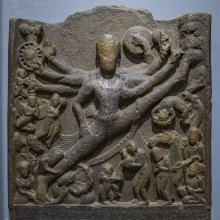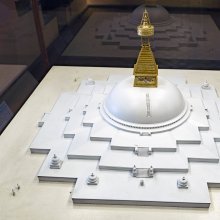Manadeva, Mānadeva, Mana-deva: 4 definitions
Introduction:
Manadeva means something in Jainism, Prakrit, Hinduism, Sanskrit, the history of ancient India. If you want to know the exact meaning, history, etymology or English translation of this term then check out the descriptions on this page. Add your comment or reference to a book if you want to contribute to this summary article.
Images (photo gallery)
In Jainism
General definition (in Jainism)
Source: academia.edu: Tessitori Collection I1) Mānadeva (मानदेव) or Mānadevasūri is the name of a teacher mentioned in the Bṛhadgaccha-gurvāvalī (dealing with Jain lineages history) (in Sanskrit/Prakrit/Gujarati), which is included in the collection of manuscripts at the ‘Vincenzo Joppi’ library, collected by Luigi Pio Tessitori during his visit to Rajasthan between 1914 and 1919.—The information provided by the Bṛhadgacchagurvāvalī for the teachers [e.g., Mānadeva-sūri] includes their literary achievements, reference to installation of images, and, the case arising, their feats in debates with non-Jains. [...]
2) Mānadeva (मानदेव) or Mānadevasūri is the name of a teacher belonging to the añcala-gaccha, according to the Añcalagaccha-paṭṭāvalī (dealing with Jain lineages history).

Jainism is an Indian religion of Dharma whose doctrine revolves around harmlessness (ahimsa) towards every living being. The two major branches (Digambara and Svetambara) of Jainism stimulate self-control (or, shramana, ‘self-reliance’) and spiritual development through a path of peace for the soul to progess to the ultimate goal.
India history and geography
Source: Brill: Śaivism and the Tantric Traditions (history)Mānadeva (मानदेव) is the patron of the Mānavihāra monastery in Kathmadu valley.—According to the Gopālarājavaṃśāvalī, the earliest local chronicle, the following monasteries and caitya were named after the donor: the Mānavihāra by Mānadeva, the Dharmadevacaitya by Dharmadeva, and the Devalavihāra by Devaladeva (Sanderson 2009, 74). The first one is confirmed by its mention in an undated inscription assigned to his reign (Sanderson 2009, 75). Several of the monasteries of the Kathmadu valley are attributed to kings of the period of the Ṭhākurī kings—most probably Kuladatta flourished in this period—in inscriptions, palm-leaf deeds, manuscript colophons, or their own tradition. But no monastery or caitya named after a king is reported (Sanderson 2009, 77–80).

The history of India traces the identification of countries, villages, towns and other regions of India, as well as mythology, zoology, royal dynasties, rulers, tribes, local festivities and traditions and regional languages. Ancient India enjoyed religious freedom and encourages the path of Dharma, a concept common to Buddhism, Hinduism, and Jainism.
Languages of India and abroad
Sanskrit dictionary
Source: Cologne Digital Sanskrit Dictionaries: Monier-Williams Sanskrit-English DictionaryMānadeva (मानदेव):—[=māna-deva] [from māna] m. Name of a prince, [cf. Lexicographers, esp. such as amarasiṃha, halāyudha, hemacandra, etc.]
[Sanskrit to German]
Sanskrit, also spelled संस्कृतम् (saṃskṛtam), is an ancient language of India commonly seen as the grandmother of the Indo-European language family (even English!). Closely allied with Prakrit and Pali, Sanskrit is more exhaustive in both grammar and terms and has the most extensive collection of literature in the world, greatly surpassing its sister-languages Greek and Latin.
See also (Relevant definitions)
Partial matches: Deva, Mana, Teva.
Starts with: Manadevasuri, Manadevata.
Ends with: Brahmanadeva, Lakshmanadeva, Nirmanadeva, Somanadeva, Sumanadeva, Vamanadeva.
Full-text: Dharmadeva, Dharmadev, Vrishadev, Manavihara, Manadevasuri, Cakravarnamahavihara, Devalavihara, Devaladeva, Dharmadevacaitya, Buddhism in nepal, Bharatacampu, Bilvamangala.
Relevant text
No search results for Manadeva, Mānadeva, Mana-deva, Māna-deva; (plurals include: Manadevas, Mānadevas, devas) in any book or story.

